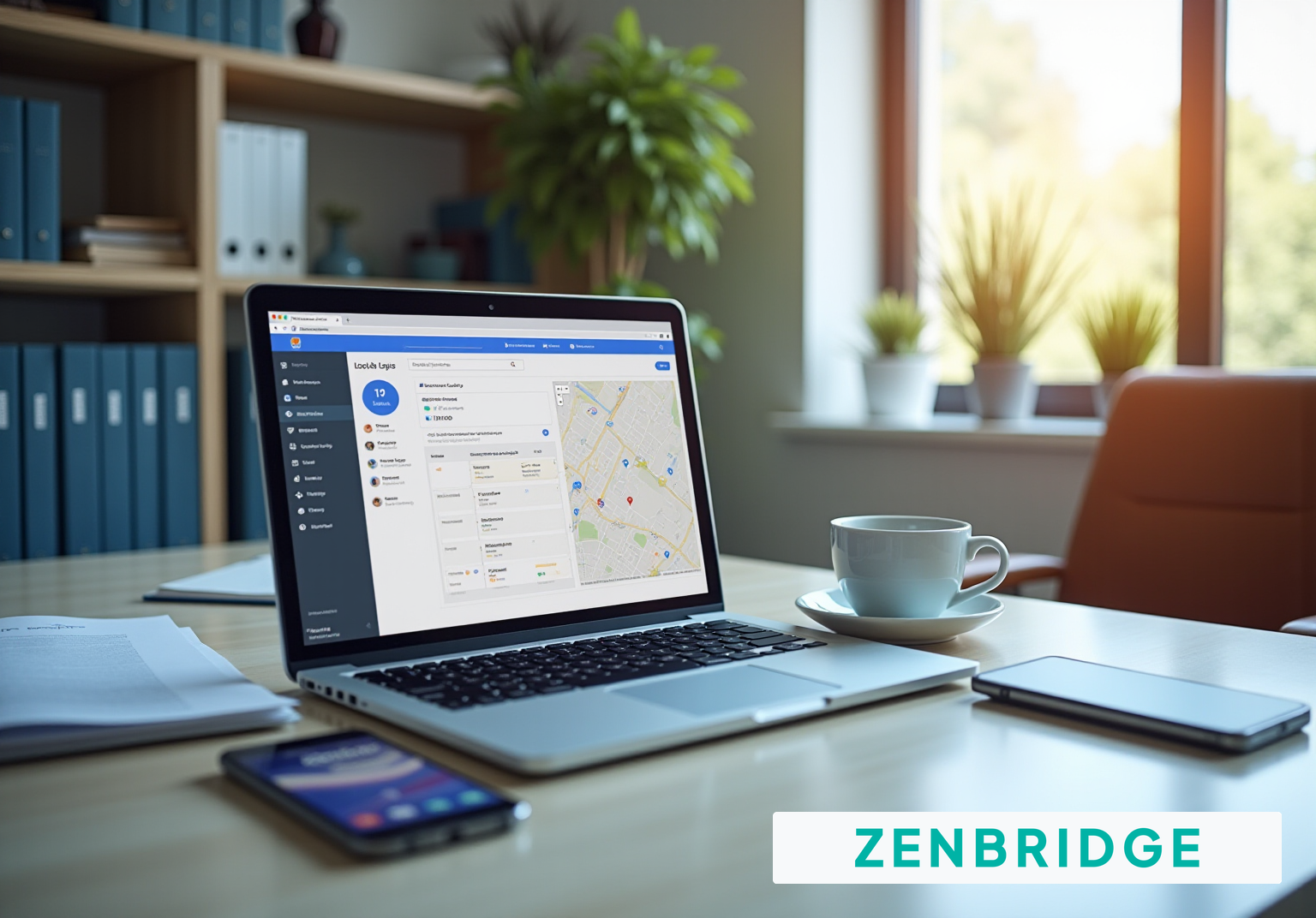
9 Essential Features for an Effective Attorney Website

Key Highlights:
- ZenBridge's UpRank service enhances local SEO and manages Google Business Profiles for legal practises.
- 46% of Google searches are location-based, making optimised Google Business Profiles crucial for attracting local clients.
- 88% of consumers who do local searches visit or contact a business within a day.
- Responsive website design improves user experience and SEO rankings, catering to various devices.
- Client portals improve communication, with 30% increase in customer satisfaction reported when 24/7 access is available.
- Legal practises with a blog can see a significant increase in website visits, with 29% of clients finding their attorney through blog content.
- Clear contact information on websites enhances client outreach, with over one-third of clients starting their attorney search online.
- 92% of consumers read online reviews before making a purchase; positive testimonials can significantly boost a law firm's credibility.
- Service area maps improve local visibility, with 30% of Google mobile searches being location-based.
- FAQ sections on websites can increase lead conversion rates by addressing common client concerns upfront.
- Secure payment systems build trust and convenience, essential for protecting sensitive information.
- Analytics tools help legal practises monitor website performance and improve marketing strategies, with 64.7% reporting the highest ROI from their websites.
Introduction
Crafting an effective attorney website isn’t just about looking good anymore; it’s a key part of a law firm's success in today’s competitive digital world. Did you know that 46% of Google searches are location-based? That really highlights how important it is to optimise for local SEO and create a user-friendly experience.
In this article, we’ll explore nine essential features that can really boost an attorney's online presence. We’ll cover everything from responsive design and client portals to smart uses of testimonials and FAQs.
But what happens if these elements get overlooked? The real challenge is navigating the tricky waters of digital marketing while making sure potential clients can easily find and trust your legal practise.
So, let’s dive in and see how you can make your website work for you!
ZenBridge UpRank: Optimize Local SEO and Google Business Management
Hey there! Let’s chat about ZenBridge's UpRank service. It’s all about boosting local SEO and managing Google Business Profiles on an attorney website for legal practises. By automating content updates and handling reputation management, this service really helps your firm stand out in local search results.
Did you know that 46% of Google searches are location-based? That’s why keeping your Google Business Profile optimised is crucial for attracting customers in your area. Regular updates and a well-organised attorney website can significantly boost organic leads and interactions from potential clients seeking legal services nearby.
And here’s something to think about: legal practises that effectively manage their Google Business Profiles can expect a significant boost in client acquisition. In fact, 88% of consumers who do local searches visit or contact a business within a day! As SEO experts say, 'A complete Google Business Profile can make customers 50% more likely to make a purchase.' That really highlights how important this management is for legal practises.
So, to stay competitive, it’s essential for legal practises to regularly cheque and update their Google Business Profiles, ensuring all the details are accurate and appealing. You know what I mean? Let’s keep those profiles fresh and engaging!
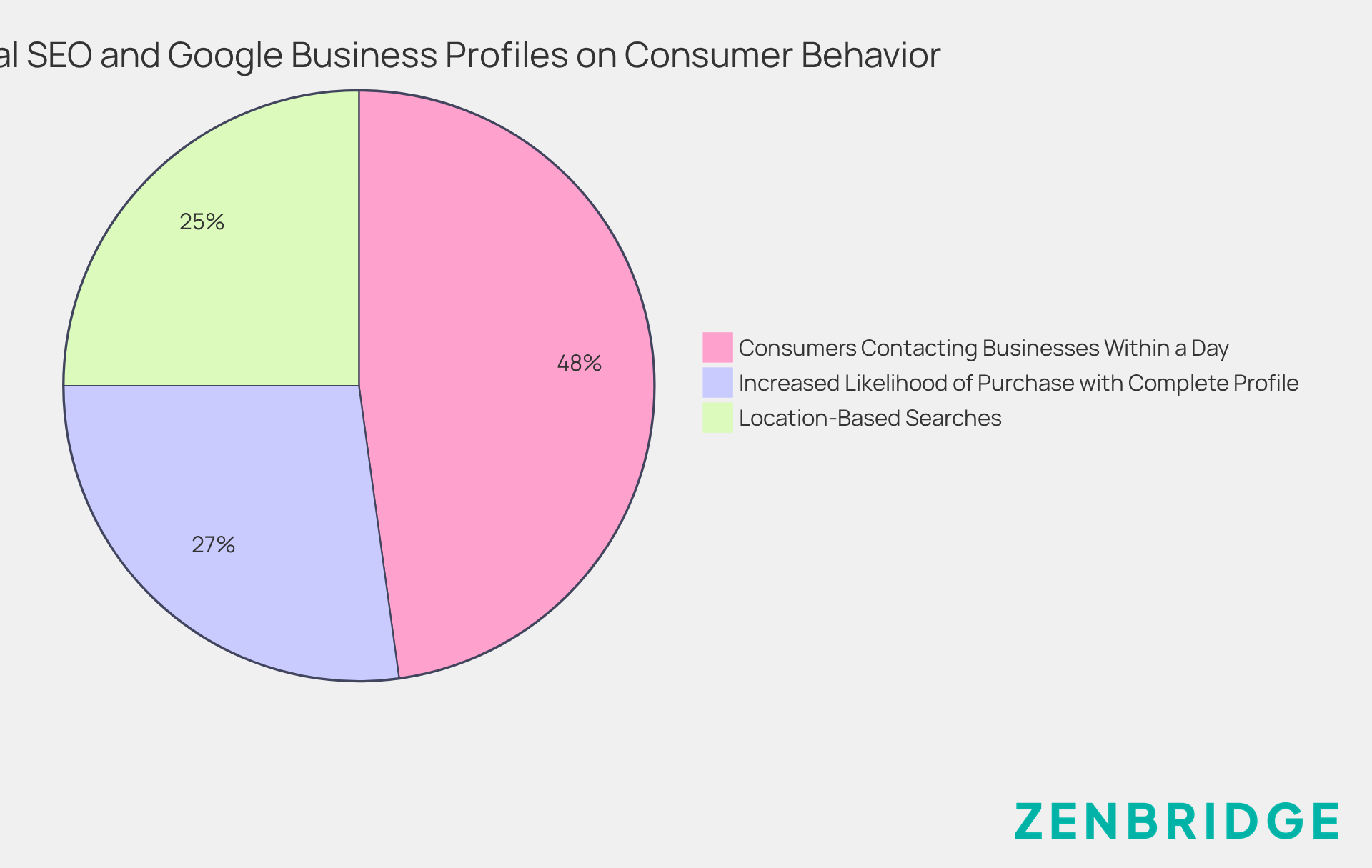
Responsive Design: Ensure Accessibility on All Devices
A responsive design is all about adapting your law firm's website to different screen sizes. This means it looks great on desktops, tablets, and smartphones! Not only does this make for a better user experience, but it also helps with your SEO rankings since search engines really like mobile-friendly sites.
By offering a seamless browsing experience, potential customers are more likely to stick around and check out your services. You know what I mean? It’s all about keeping them engaged and making it easy for them to connect with you!
Client Portal: Streamline Communication and Document Sharing
Hey there! Establishing a user portal is a game changer for individuals. It lets them securely access their case information, share documents, and chat directly with their attorneys. This centralised platform really improves clarity and boosts efficiency, making it a breeze for users to stay updated about their matters.
Did you know that research shows customer satisfaction can jump by as much as 30% when legal practises offer 24/7 access to case files through secure user portals? Pretty impressive, right? Plus, attorneys can save up to 40% of their time by automating those repetitive tasks with modern tech. By optimising communication, legal practises can build stronger connexions with their clients, leading to better retention and loyalty.
For instance, law groups that embrace modern technologies can snag new clients with 35% more success than those that stick to old methods. As Azeem Rashid, CMO of Lawtech 365, puts it, "These statistics clearly demonstrate the potential of technology in transforming the way law practises operate." So, embracing these innovations is crucial for enhancing client communication and overall service delivery in the legal field. What do you think about that?
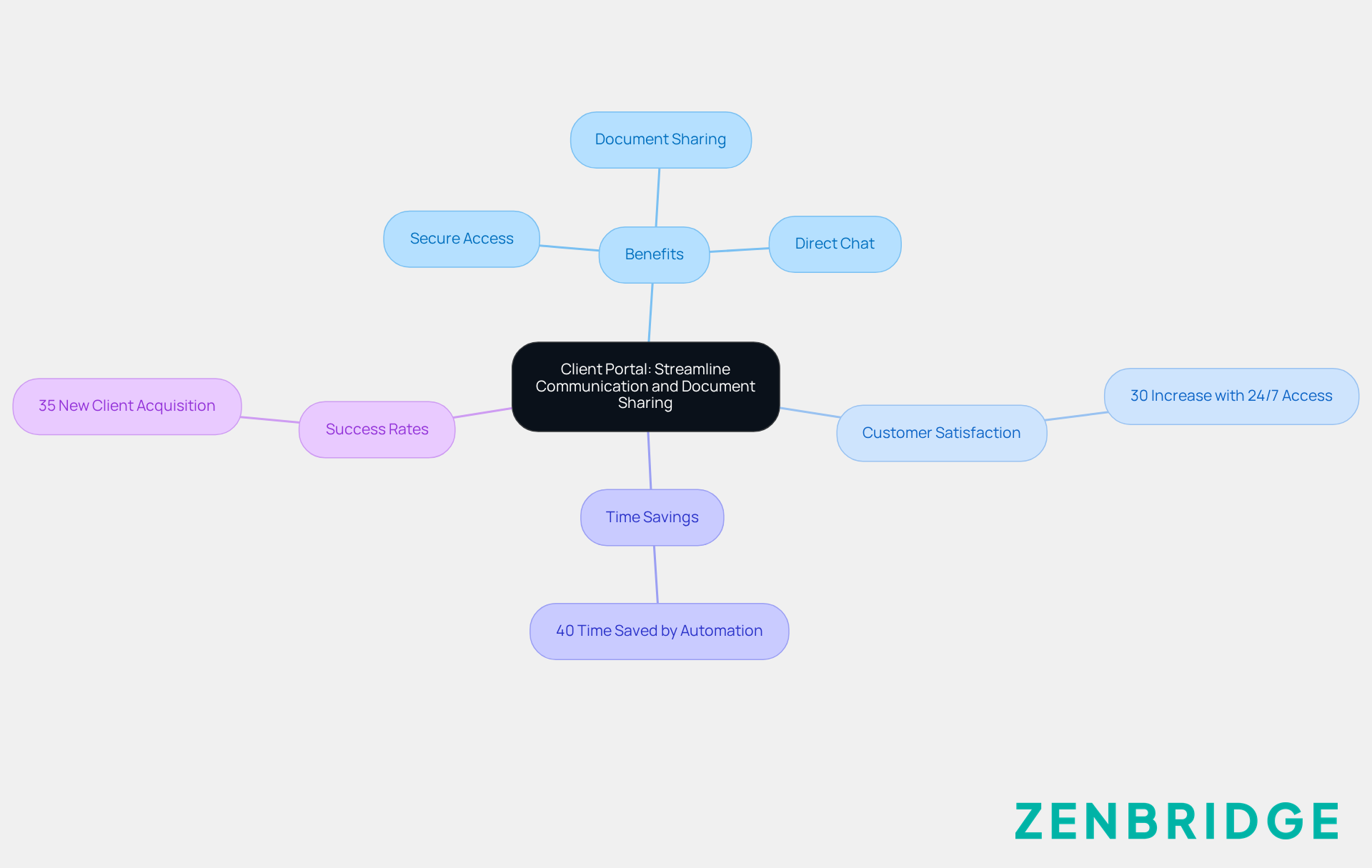
Integrated Blog: Establish Authority and Attract Clients
Incorporating a blog into your law practise's website is a smart move that brings some serious perks. By consistently putting out new content, you not only boost your site's SEO but also position your firm as a go-to resource in the legal field. Search engines love websites that keep things fresh, so regular updates are key to climbing those search rankings. Plus, by addressing common legal questions and sharing valuable insights, your blog can attract potential clients who are actively seeking legal help.
You know what’s interesting? Legal practises that keep a blog often see a noticeable increase in website visits and client inquiries. In fact, 29% of clients say they found their attorney through blog content, which really shows how blogging can help generate leads. And it doesn’t stop there—law blogs can enhance your firm’s credibility too, with 49% of users trusting online legal content just as much as personal recommendations. This trust is vital in a competitive landscape where clients are looking for reliable legal representation, leading to better engagement and retention.
Now, let’s talk about expert insights. Content marketing is crucial for establishing authority in the legal space. Andrew Shum, Head of SEO at SeoProfy, points out that "Lawyers are beginning to allocate more funds towards digital marketing strategies to reach a larger audience." By consistently sharing high-quality, informative articles, you can build a solid online presence that resonates with potential clients and encourages them to reach out about your services. Oh, and did you know that 54% of survey participants said they share legal articles from their site? This really highlights how prevalent and important blogging is among legal practises.
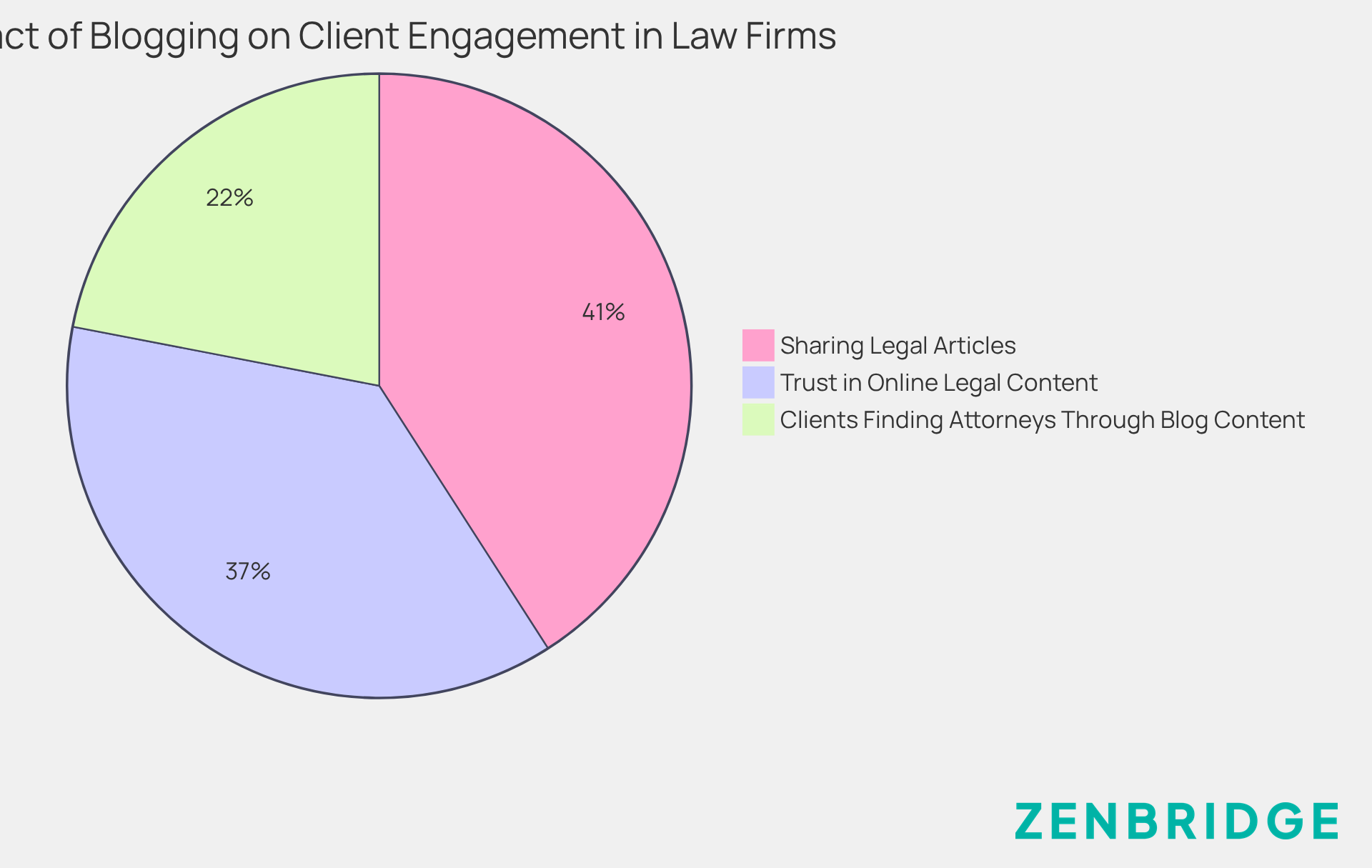
Clear Contact Information: Facilitate Easy Client Outreach
Hey there! If you’re running a legal practise, it’s super important to make sure your contact info is easy to find on your website. That means having your phone numbers, email addresses, and a user-friendly contact form front and centre. When potential customers can easily reach out, they’re more likely to get in touch.
Placing your contact details in the header or footer of every page keeps them visible, making it a breeze for people to connect with you. Did you know that over one-third of folks start their attorney search online? That’s why having clear contact info is key to capturing those leads!
Now, here’s another thing to consider: 42% of legal practises take more than three days to respond to inquiries. That really highlights how crucial it is to follow up quickly, especially when your contact details are easy to find. Practises that have made their websites more accessible have seen some impressive boosts in outreach—proving that a well-organised site can really help with lead generation.
And get this: 35% of phone calls from potential customers go unanswered. That’s a big number! So, making sure your contact methods are not just accessible but also responsive is essential. By prioritising easy outreach for customers, your practise can really up its chances of turning visitors into clients, which is all about driving growth and success. You know what I mean?
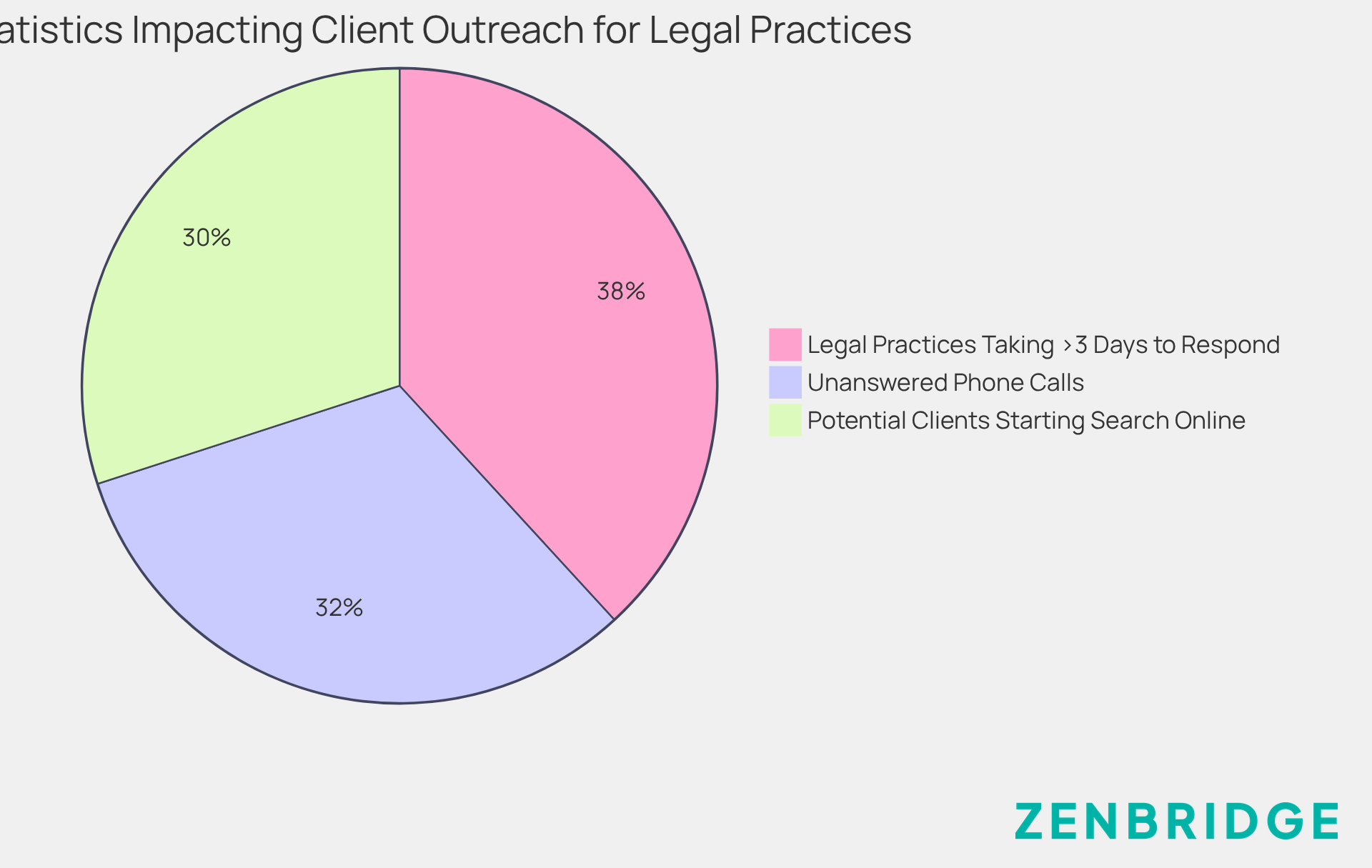
Testimonials and Reviews: Build Trust and Credibility
Hey there! Including testimonials and reviews on your attorney website can really boost your law firm's credibility. Genuine feedback from happy clients serves as powerful social proof, showcasing how effective and reliable your services are. Did you know that 92% of customers read online reviews before making a purchase? Plus, 72% of consumers are more likely to trust a business after seeing positive testimonials.
So, to make the most of this, encourage your customers to leave reviews on platforms like Google and Yelp. Businesses with five-star ratings grab a whopping 69% of total clicks among top Google listings. And get this: moving from a 3-star to a 5-star rating can increase your clicks by 25%! Clearly displaying these endorsements on your attorney website not only attracts new customers but also boosts your standing in a competitive market.
For instance, a legal practice with over 100 glowing Google reviews will consistently outshine competitors with fewer evaluations in local search rankings. And it’s interesting to note that 88% of consumers trust online testimonials just as much as recommendations from friends or family, which really reinforces the credibility of testimonials.
By making it easy for clients to provide feedback—automating requests when you can and following up—you can create a steady stream of positive reviews that enhance your organisation’s credibility and help you gain new business. And hey, consider adding video testimonials too! They’re becoming increasingly impactful and can really elevate your marketing efforts. So, what do you think? Ready to give it a shot?
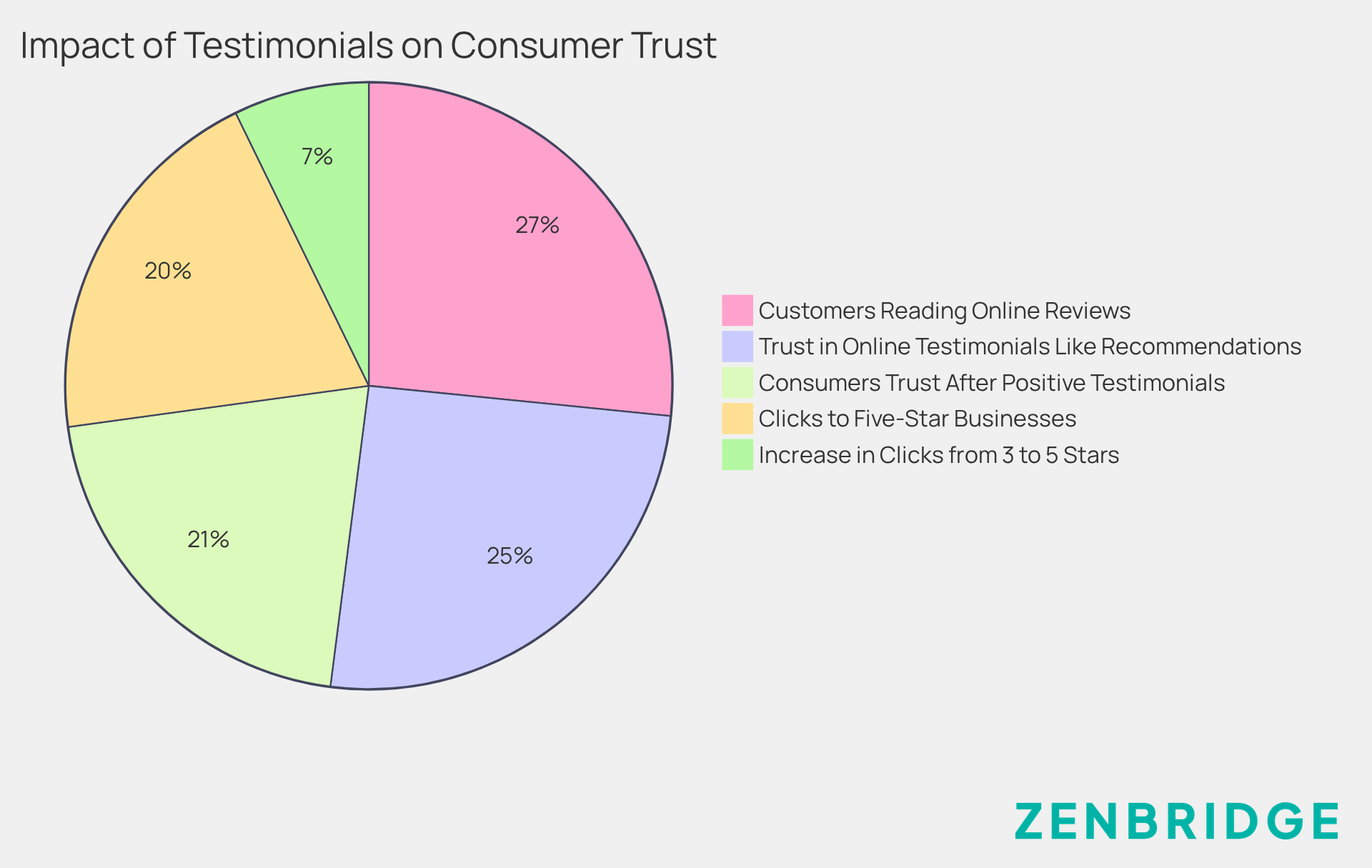
Service Area Map: Enhance Local Visibility and Reach
Hey there! Including a service area map on your website is super important for boosting your local visibility and attracting potential customers. This handy visual tool helps visitors quickly see the areas your legal practise covers, which is key for local SEO. An engaging and easy-to-understand map not only shows your reach but also plays a big role in winning over customers.
You know what? Legal practises that use service area maps often see more engagement from nearby clients. These maps help build trust and transparency about what services are available. Plus, did you know that 30% of all Google mobile searches are location-based? That means having a well-optimised service area map can really up your chances of showing up in local search results, bringing more traffic to your business.
And here’s the deal: since mobile devices account for over 60% of all web traffic worldwide, it’s crucial to make sure your map is mobile-friendly. By optimising your service area map and keeping it updated to reflect any changes in your service regions, you can effectively boost your online presence and connect with folks actively looking for legal services nearby. So, what are you waiting for? Let’s get that map sorted!
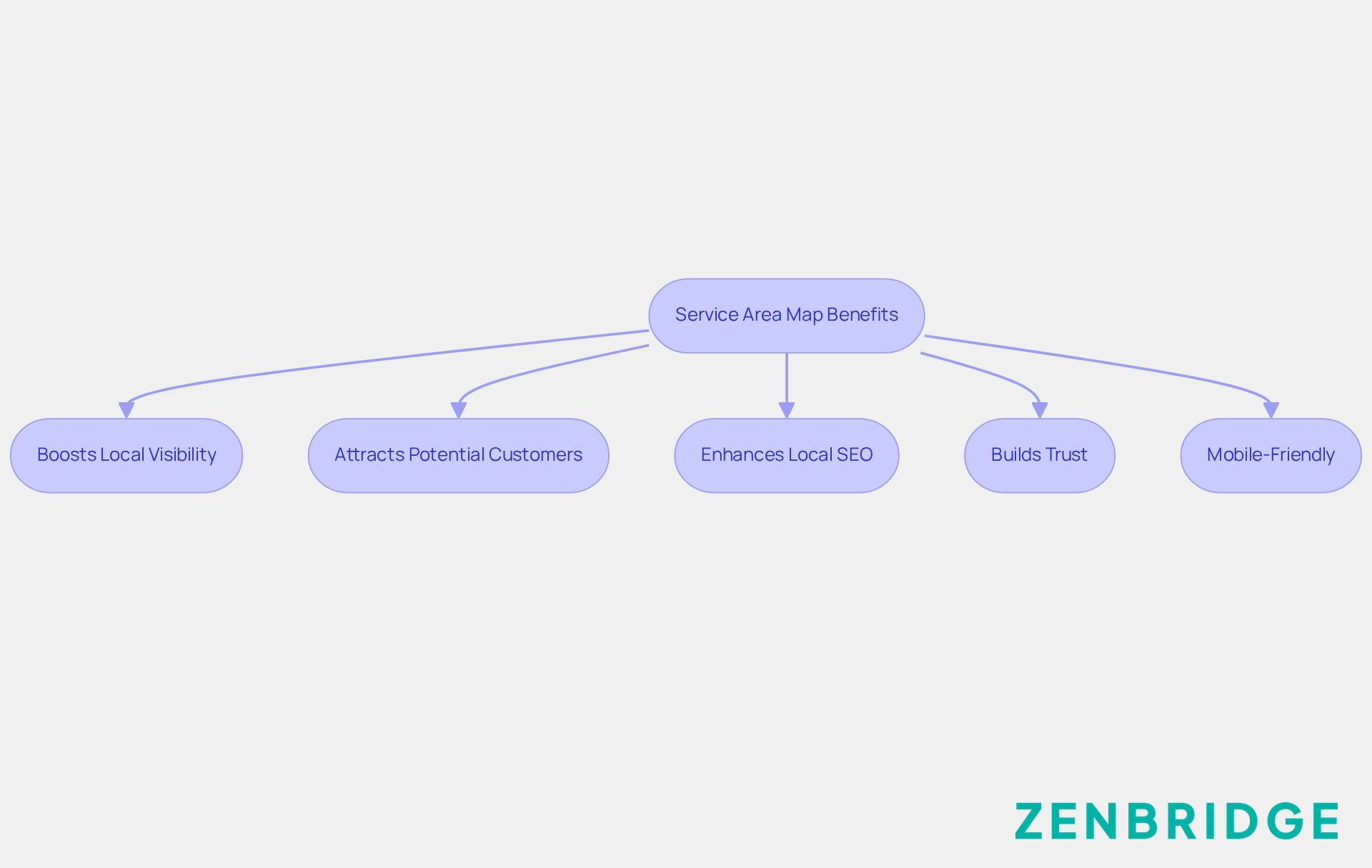
FAQ Section: Address Common Client Concerns
Including a Frequently Asked Questions (FAQ) section on your legal practise's website can really boost user experience. By addressing common customer concerns upfront, you give quick answers that empower potential clients, making them feel informed and confident about reaching out. This approach not only improves communication but also positions your firm as knowledgeable and approachable.
Did you know that 57% of a purchase decision is made before consumers even engage with a business? This highlights the importance of providing relevant information right away. Legal practises that effectively use FAQs often see a significant bump in lead conversion rates. Customers love the convenience of finding answers without having to navigate away from the page. For example, firms that organise questions by specific topics make it easier for visitors to find what they need quickly and efficiently.
Plus, addressing customer concerns through FAQs can lead to happier, more loyal clients. Engaged customers are more likely to convert, with studies showing that successfully engaged individuals can bring in an average 23% premium in profitability and relationship growth compared to typical customers. As Michael Kammer points out, an FAQ page can tackle common questions you’d otherwise spend time and resources answering, freeing up your customer service team to focus on unique inquiries. By creating a well-structured FAQ section on their attorney website, legal practises can boost their credibility and build trust with potential clients, ultimately driving growth and success. And don’t forget, optimising FAQ pages for SEO can significantly improve a law office's search engine rankings and traffic, enhancing visibility even further.
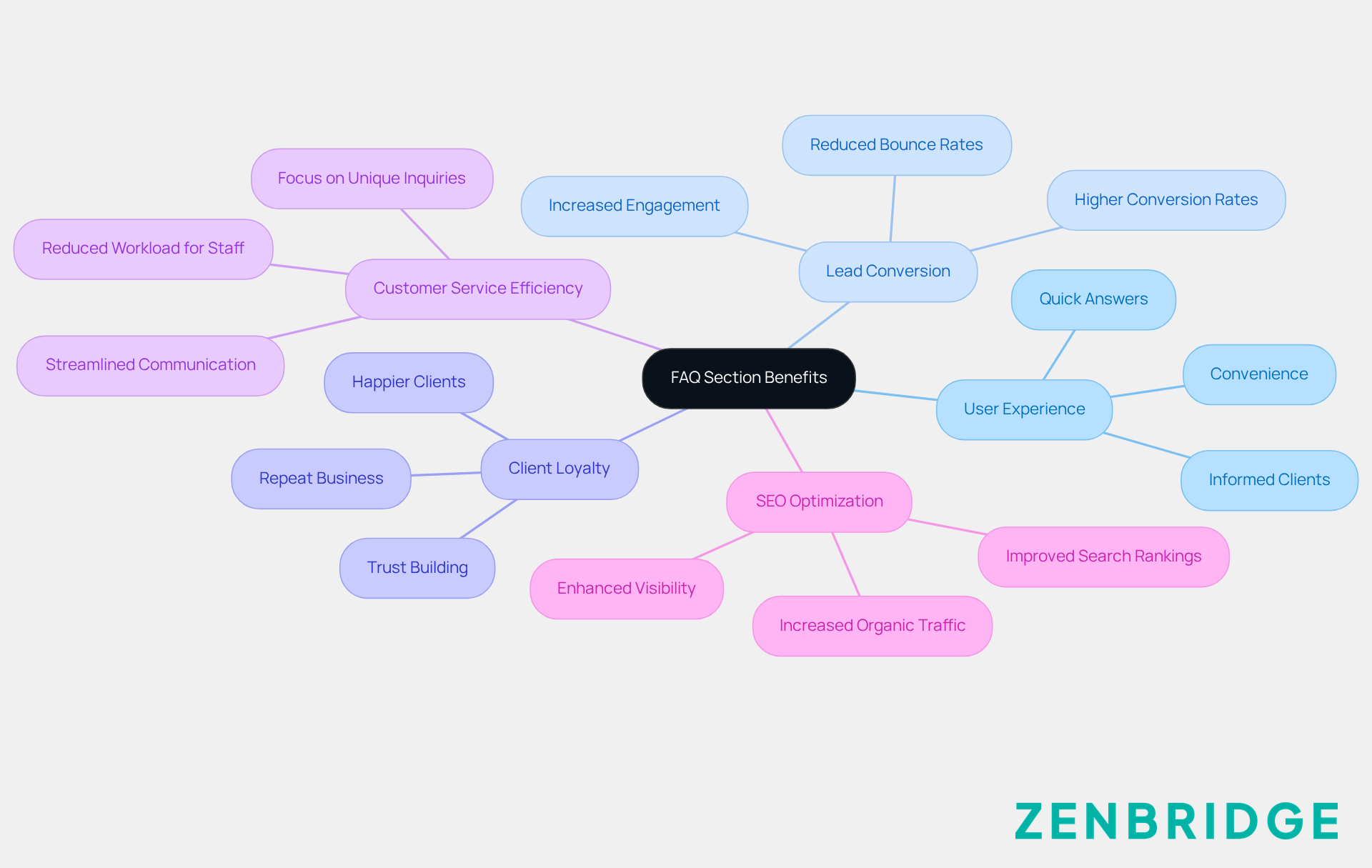
Secure Payment System: Ensure Trust and Convenience
Hey there! Establishing a secure payment system on your attorney website is essential for protecting sensitive financial information and building trust with your clients. You know, clients are really leaning towards businesses that offer secure and convenient payment options, especially with the growing demand for digital payment solutions.
A smooth payment processing system not only meets industry standards like PCI DSS but also makes the overall customer experience much better. Legal practises that use secure payment solutions—think PCI Level 1 certified software, virtual POS systems, and advanced encryption protocols—can significantly reduce the risk of data breaches and chargebacks. This, in turn, leads to happier customers!
Plus, being clear about your billing practises can help reduce disputes and keep that trust intact. By prioritising payment security and compliance, you can foster stronger relationships with your customers, ensuring transparency and reliability in financial transactions. And hey, regular training for your employees on fraud detection is a smart move to protect your business interests. So, what do you think? Let's chat more about this!
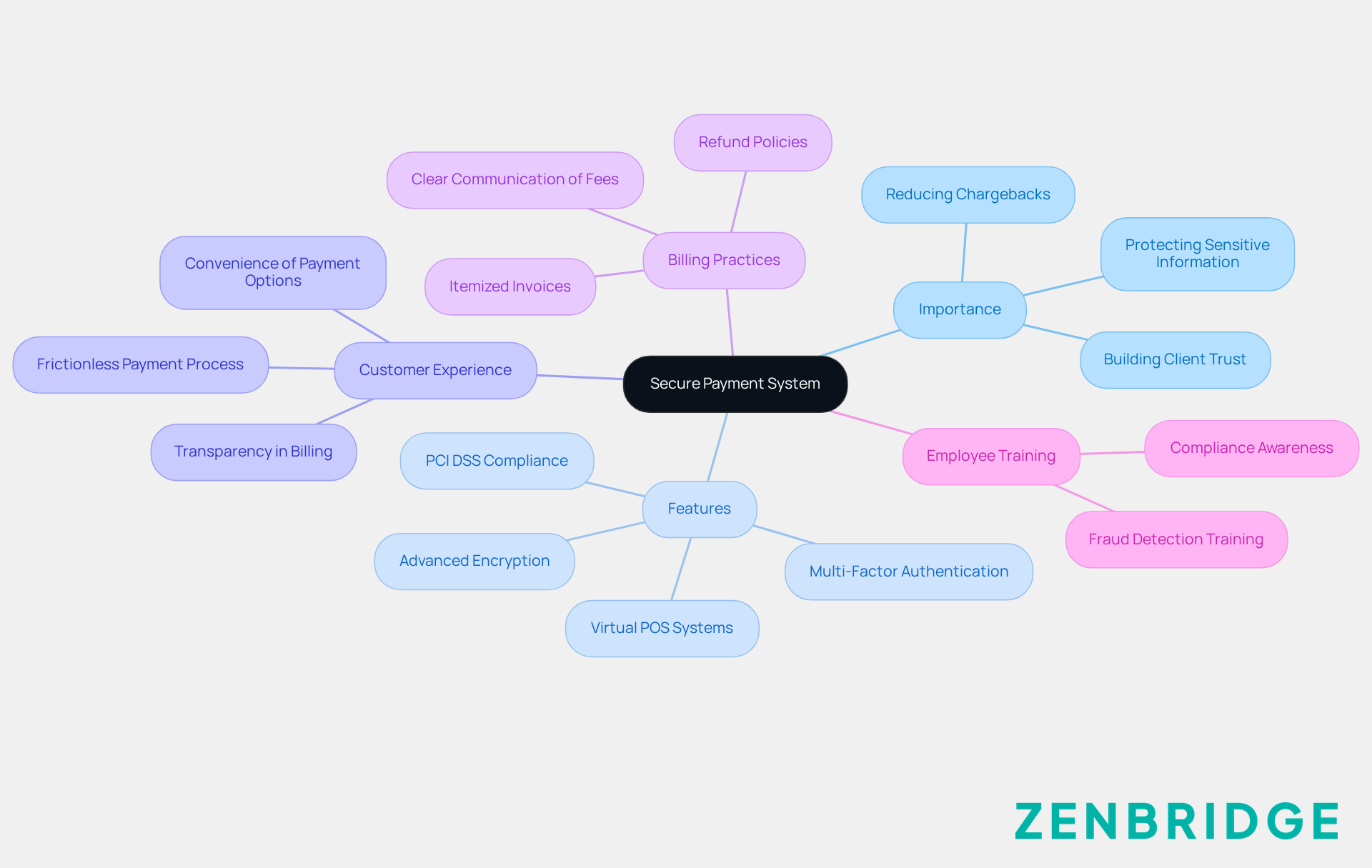
Analytics Tools: Gain Insights for Continuous Improvement
Hey there! If you're in the legal field and looking to amp up your marketing game, an attorney website that utilises analytics tools is a must. Platforms like Google Analytics allow you to keep a close eye on how your website is performing, track visitor behaviour, and cheque out those conversion rates. This data-driven approach helps lawyers spot areas that need a little TLC, making it easier to tweak strategies that resonate with what users want.
For instance, understanding which content really grabs the attention of potential clients can shape your future marketing efforts, ensuring your website not only attracts visitors but also turns them into leads. Plus, keeping tabs on customer engagement metrics gives you valuable insights into how well your legal practise is connecting with its audience—ultimately leading to stronger relationships and better customer retention.
As the legal landscape shifts, embracing these analytics tools can be effectively showcased on an attorney website to help firms stay competitive and responsive to client needs. Did you know that 64.7% of legal practises say their website delivers the highest ROI? That really highlights the importance of performance monitoring! And with 81% of attorneys using LinkedIn for marketing, blending analytics with your broader digital strategy is key.
Oh, and here's something to think about: 66% of clients say they’d be put off by non-personalised content. This really underscores the need for tailored marketing approaches. As Caroline Vahue, an Account Manager, puts it, "Each year on average, a law firm will typically invest 49% of its budget toward marketing." This just goes to show how crucial data is in making the most of those investments. So, what do you think? Ready to dive into the world of analytics?
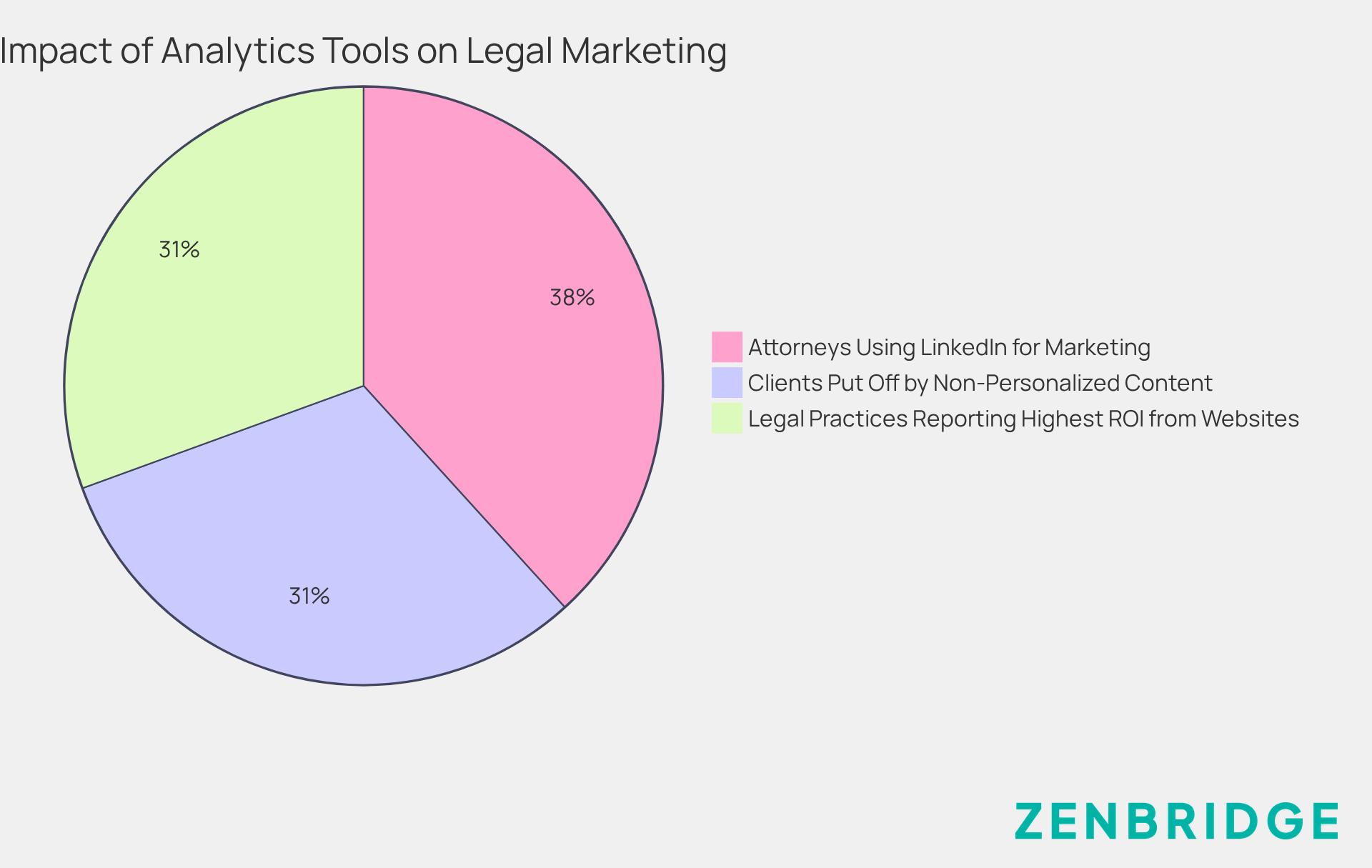
Conclusion
You know what? An effective attorney website is absolutely essential for legal practises looking to attract and keep clients in today’s competitive market. By integrating some must-have features like local SEO optimization, responsive design, client portals, and clear contact information, law firms can really boost user experience and client engagement. These elements not only make communication smoother but also build authority and trust—key factors in turning website visitors into clients.
Now, let’s dive into some key features that can really elevate an attorney's online presence:
- Regularly updating your Google Business Profile can give you a nice boost in local visibility.
- A responsive design ensures your site looks great on any device.
- Implementing client portals is a smart move for better communication.
- Keeping an active blog can help position your firm as a go-to resource.
- Clear contact information, testimonials, service area maps, and FAQs help build credibility and make it easier for clients to reach out.
- Secure payment systems and analytics tools are crucial for enhancing client trust and driving continuous improvement.
Incorporating these features isn’t just about keeping up with trends; it’s about crafting a user-centric experience that resonates with potential clients. By prioritising these essential elements, legal practises can not only boost their online visibility but also cultivate strong relationships with clients, leading to growth and success. So, here’s the deal: embracing these best practises will ensure that your attorney website remains an effective tool for client acquisition and retention in this ever-evolving digital landscape. If you have any questions or want to discuss this further, feel free to reach out!
Frequently Asked Questions
What is ZenBridge's UpRank service?
ZenBridge's UpRank service focuses on boosting local SEO and managing Google Business Profiles specifically for legal practises. It automates content updates and handles reputation management to help law firms stand out in local search results.
Why is optimising a Google Business Profile important for legal practises?
Optimising a Google Business Profile is crucial because 46% of Google searches are location-based. A well-maintained profile can significantly increase organic leads and interactions from potential clients seeking legal services in the area.
How does managing a Google Business Profile affect client acquisition?
Legal practises that effectively manage their Google Business Profiles can expect a significant boost in client acquisition. Research shows that 88% of consumers who conduct local searches visit or contact a business within a day, and a complete profile can make customers 50% more likely to make a purchase.
What is responsive design in the context of a law firm's website?
Responsive design refers to adapting a law firm's website to different screen sizes, ensuring it looks appealing on desktops, tablets, and smartphones. This enhances user experience and positively impacts SEO rankings, as search engines favour mobile-friendly sites.
How does a responsive design benefit potential customers?
A responsive design provides a seamless browsing experience, making it easier for potential customers to engage with the website and explore the services offered by the law firm.
What is the purpose of a client portal in legal practises?
A client portal allows clients to securely access their case information, share documents, and communicate directly with their attorneys. This centralised platform improves clarity and boosts efficiency for both clients and attorneys.
What impact does a client portal have on customer satisfaction?
Research indicates that customer satisfaction can increase by as much as 30% when legal practises offer 24/7 access to case files through secure user portals.
How can modern technology benefit attorneys in their practises?
By automating repetitive tasks with modern technology, attorneys can save up to 40% of their time. This optimisation of communication leads to stronger connexions with clients and better retention and loyalty.
What advantage do law groups that adopt modern technologies have over those that do not?
Law groups that embrace modern technologies can acquire new clients with 35% more success compared to those that continue using outdated methods.
